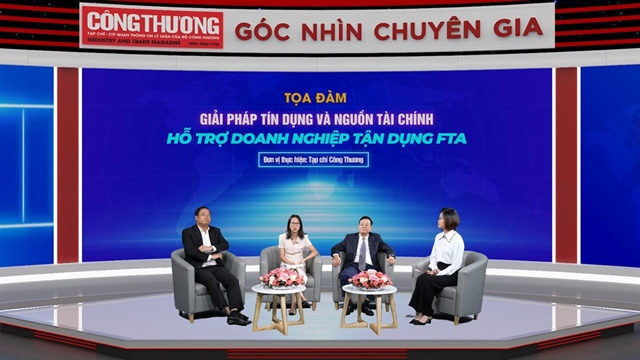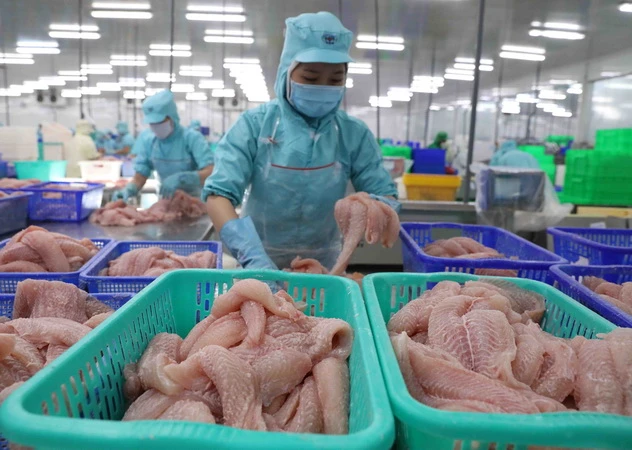 Economy
Economy

 |
| A forum on credit and capital solutions for helping businesses exploit free trade agreements in Hà Nội. According to experts, businesses’ exploitation of FTAs is hindered by lack of access to credit. — VNA/VNS Photo |
HCM CITY — The Ministry of Industry and Trade and other relevant agencies are focusing on helping businesses access credit on favourable terms to help them exploit free trade agreements such as the UKVFTA and EVFTA.
The ministry has been implementing various measures to enhance the effectiveness of the FTAs, and relevant agencies have also issued numerous fiscal policies and incentives to diversify credit sources, helping businesses take advantage of FTA opportunities.
According to experts, while global political and economic challenges have generally hindered trade this year, Việt Nam’s exports to FTA partner-countries still saw positive results.
In the first ten months of the year, Việt Nam's trade with the UK was worth US$5.87 billion, a 1.6 per cent year-on-year increase, and with the EU, nearly $60.8 billion (6 per cent lower).
During a forum on credit and capital solutions to help businesses exploit FTAs in Hà Nội, Nguyễn Thị Lan Phương, deputy head of the WTO and FTA division at the ministry’s Department of Multilateral Trade Policy, said that despite the best efforts of Government agencies and businesses, the implementation of FTAs has faced hurdles.
Exports to partner countries only account for a small proportion of Việt Nam’s total exports, and businesses have yet to fully utilise the agreements, she said. The latter’s participation in global supply chains are also relatively low, she said.
“There are numerous reasons as to why the FTA implementation is limited, but we believe that one of the biggest reasons is the difficulty businesses have in accessing funding.”
According to a 2022 report by the Research Board for Private Economic Development under the Advisory Council for Administrative Procedure Reform, difficulties related to cash flow (including working capital, medium-term and long-term investment capital) are putting local businesses in greatly challenging positions. Raising resources to sustain their operations is the biggest struggle for private businesses.
Certain demanding markets have requirements related to environmental protection and product quality, and Vietnamese businesses have to make investments in modern machinery and technology, but many lack the resources for this, which leads to the risk of losing their positions in global supply chains.
A report by the ministry on the implementation of UKVFTA, CPTPP and EVFTA also pointed out that many Vietnamese businesses have the capability and experience for producing high-quality goods, and want to build Vietnamese brands, but they lack the funding to do so.
There have been programmes linking up businesses with banks to help them take advantage of export opportunities brought by the FTAs, but they are not efficient enough to satisfy businesses' demands, it said.
A 2022 survey by the Việt Nam Chamber of Commerce and Industry affirmed the fact that the biggest challenge private businesses face is accessing credit. Specifically, in 2022 around 55.6 per cent of the surveyed businesses said that they are having problem accessing credit, meanwhile this figure was only 46.9 per cent in 2021, 40.7 per cent in 2020, and 34.8 per cent in 2019.
Phương said: “The ration of loans that do not need to be backed by property is very small compared to other countries at only 25 – 30 per cent, and over 70 per cent of the loans have to be backed by property.”
Nguyễn Quốc Hùng, general secretary and deputy chairman of the Vietnam Banking Association, said banks have a liquidity surplus and businesses that export to countries having trade deals with Việt Nam are among the priority groups for lower interest rates – of as low as 4 per cent – but they cannot lend to businesses who cannot satisfy borrowing conditions.
Businesses also need to strive towards green production, which is a growing trend, he added.
He also hoped that the Government can instruct localities to expand their credit guarantee programmes for small and medium-sized businesses to ensure higher credit access for them.
 |
| A plant that makes shark catfish fillet for export in Đồng Tháp Province. Financial support can help businesses make better use of new-generation FTAs. — VNA/VNS Photo |
Phương said her ministry has submitted a report on the implementation of new-generation FTAs in 2022 to the Government, asking for the central bank to be instructed to provide businesses with easier access to credit to better use the trade deals, especially businesses who want to be more environment-friendly and socially responsible, she said.
Businesses should focus on their core strengths and commit to them long term since spreading themselves too thin would make it hard for them to get loans, she warned.
They also need to improve their own capabilities, production technologies, costs reduction and financial management.
Nguyễn Hoài Nam, deputy general secretary of the Việt Nam Association of Seafood Exporters and Producers, hoped businesses can continue to benefit from low-interest loans from banks to enable their recovery in 2024.
Việt Nam has signed and implemented 16 free trade agreements since 2007, with three new-generation FTAs including the Comprehensive and Progressive Agreement for Trans-Pacific Partnership (CPTPP), the European Union-Vietnam Free Trade Agreement (EVFTA) and the UK-Vietnam Free Trade Agreement (UKVFTA). — VNS




